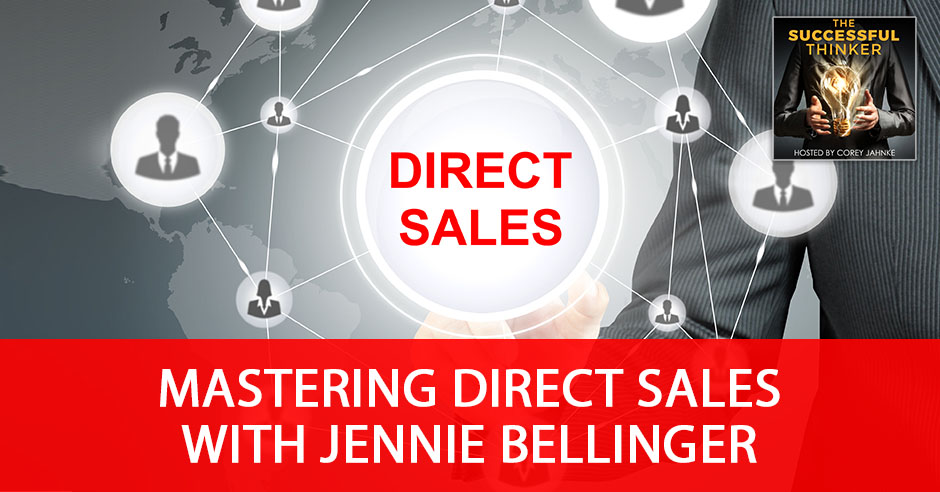
Direct sales expert and certified coach Jennie Bellinger shares the difference between successful thinkers and average thinkers with host Corey Jahnke. Jennie takes a unique “whole person approach” to helping her clients win in the marketplace and in their personal lives. This is an honest and upfront personal look at why some people reach their goals while others spin their wheels and flounder. Join Corey and Jennie and learn how you can be more successful in direct sales and in life.
—
Listen to the podcast here:
Mastering Direct Sales with Jennie Bellinger
How To Go All In And Win In Sales And In Life
One of the most important skills you’ll ever develop in your life is sales skills. What we want to do is to bring in thought leaders that helped change the way people have a paradigm in their mind regarding a particular area of interest. One of the things that we’re always doing is we’re always selling ourselves in one way or another and I have a dynamic. She is a sales coach and trainer. She is hired by direct sales representatives to increase sales, grow their team with active and successful team members and to live the life they post about on Facebook. We had a conversation about Facebook envy. This is an interesting person because she’s out there doing what other people are bragging about doing. This person’s name is Jennie Bellinger and she is one of the most dynamic sales people you’ll find. She’s a mother of two young ladies. She co-parents them with their wonderful father. She started her professional career in direct sales in 2010. She steadily rose within her company to a position of leadership that was recognized internationally for team growth in sales. She helps other people to get to those levels. Jennie, welcome to our show.
Thanks, Corey, for having me. I appreciate it.
A lot of people struggle with direct sales. What do you think causes them to struggle so much and why are successful salespeople different?
They have a fear of looking pushy or naggy in their sales process. What they do is they will have the conversation up to a certain point and then they won’t ask for the sale. They have difficulty because they’re not getting sales because they are afraid. Fear holds them back from completing the sales process in a way that’s going to help them be successful.
Brian Tracy said that when they interview customers and the customer says, “Why didn’t you buy?” They said, “The guy never asked for the sale.” What do you think is the number one way to overcome that?
Approach the conversation as a way of getting to know the person who you are talking to and figuring out how the two of you can work together. If your product or service is going to be something based on the answers that they give, your product or service is going to be able to help them improve the quality of their lives in one way or another, then you have the conversation of how they can add this product or service into their lives. How they pay for it, how they interact with you in order to get that product or service. In that way, you know that you’re not selling. All you’re doing is adding quality to the life of the person sitting across from you.
One of the things that I’ve struggled with as a younger person is the word sales. For some reason, sales seem like a bad thing. We don’t want to come across as salesy. I don’t want to be a salesman. Yet, we know that most of the highest paid people in our society are excellent salespeople. What do you think should be the paradigm shift so that a person looks at sales in a different light?
It helps to know the history of the word sales. If you look at the history of that word, it starts in old English and it comes from the word sealer, which means to give. Doesn’t that just give you goosebumps to think about sales as a way of giving? It’s giving on both sides of the interaction. You have something of value. The other person has something of value. You have the product or service that they need. They have money that you need in order to make the exchange. You’re giving to each other. It’s a matter of figuring out, “Is my product or service is something that they need or want? Is the value that has been placed on my product or service something that they can afford?” Have that conversation to make sure that you both have something to give and it’s going to be valuable to both of you. Looking at that exchange is going to help change the mindset around the sales process because then it’s all about, “How can I give value to you? How can you give value to me?” That’s a win-win right there.
The people who are successful in life and in direct sales are the people who demonstrate a real level of commitment versus just an interest in an activity that they treat as a hobby. Share on XIf I find the right person that is a consultant, I end up being much happier with my purchase. Sometimes I’ve gone out and I didn’t want to deal with a salesperson and I bought something that didn’t work for me or overbought or underbought. Do you think salespeople can position themselves to prevent that from happening?
The most successful salespeople are the people who make sure that they are the expert on their product or service. In that way, people want to know more about that product, service or that industry. I have a lot of clients who are in the skincare direct sales industry. We have conversations about becoming an expert about skin, becoming experts about their product, becoming experts of how to use it, how to obtain it and how to make it the most possible valuable thing that their clients could utilize. Becoming an expert in your industry makes it to where people want to work with you. How many people want to work with a hobbyist? Would you be happy walking into a tattoo shop and have a tattoo artist who is a professional, expert, who has been doing it for a number of years, has been trained, attends regular training, stays up on the best methods for cleanliness, artful and very creative or do you want the hobbyist?
We all know direct salespeople who say, “Normally I’m a nurse or normally I’m a pharmacist, but on the side.” Once you use that, “On the side,” I think you’ve lost me.
When people treat their direct sales business as their side gig, when they talk about it as their side gig, when they think about it as their side gig, it’s going to always be your side gig. There’s nothing wrong with that. I wholeheartedly believe on the side job multiple streams of income in order to reach your financial goals. That’s one of the things that all financial advisors have a discussion with people about, “How many streams of income do you have coming into your household?” There’s nothing wrong with a side gig, but if your goal for your direct sales business is to turn it into your full-time career, then you can’t think about it, talk about it and treat it as a side gig. It needs to be thought about, talked about and treated as your full-time, even if it’s not yet there.

We wouldn’t do that with our full-time gig. We wouldn’t say, “I don’t feel like staying up on pharmacy,” or nursing, whatever your full-time gig is. That’s your main source, but we all talk about leaving that full-time gig. You said something that Napoleon Hill would have been proud of. He talks about, “Your goal needs to become your obsession.” We’ve talked about a number of obstacles. When obstacles present themselves, what are your strategies for overcoming them and reaching the desired result?
When there’s an obstacle in my way, I’ve got an all-in mindset on whatever it is that I’m working on and that obstacle now becomes my next goal. How do I get over it? How do I get around it? How do I get under it? How do I go through it? What is it going to take? The second thing is I’m willing to ask for help and this is not something that I was always willing to do. That was a learned skill that I got from being in business for years and realizing I can’t do it all. When I encounter an obstacle and it’s not something that I’ve ever been through before, I start talking to other people saying, “This is what I’m going through right now. Have you been through that?” If the answer is yes, how did you get through it? How did you get over it, around it, under it, through that obstacle? I learn from people who’ve been there before.
If you have an all-in mindset and you realize that you’re not going to let anything stand in your way, that shows a real level of commitment versus an interest in what you’re doing. A lot of people who are interested in building their businesses, they’re not always committed to building their businesses. If an obstacle is something that’s going to be enough to hold you back from getting to your next goal, then you’re not truly committed to your business. Sometimes the obstacle is just redirecting you going, “Maybe that’s not the exact goal that you should be going after.” It can sometimes be something that you’re ready that’s going to redirect you to whatever your goal should be.
It’s a real level of commitment versus an interest. When you were talking about that, it reminded me of a Brendon Burchard video where I was watching him explain something about how to do something. All of a sudden, he just got irritated and he was like, “This is where people would say, ‘Brendon, I don’t know how to do this or that. I don’t know how to do whatever.’” It was out of character, which is why it struck me. He goes, “If you want to be successful, figure it out or find someone who can figure it out.” I adopted that philosophy for my own life. When I’m doing some of the things that we never to school for like building a website for my show, if I get stuck, I google it. If I can’t find it on Google, then I find somebody who knows. Lo and behold, most of the things that we allow to hold us back are silly. If you stop and take a step back and go, “I don’t know how to pick up the phone.” You’ve been picking up a phone all your life. When people tell you, “I don’t know how.” Do you have a response to them?”
One of the most important skills you'll ever develop in your life is sales skills. Share on XI go, “That’s what YouTube is for.” If you look on YouTube, there’s a tutorial for everything. When I was looking at colleges and high school and my dad would say, “One of the things you’ves got to keep in mind is what kind of coursework did they have at the school. If they include something like underwater basket weaving, maybe that isn’t the school for you.” When YouTube came out, I started realizing how many tutorials they have on YouTube. I went and looked up, “Does YouTube have a tutorial for underwater basket weaving?” They do. If you can learn how to basket weave underwater from YouTube, you can learn how to do anything.
It is a mindset of being willing to be a lifelong learner and not let anything stand in your way because somebody has the answer. If you’ve got the question, somebody’s got the answer. There are no new problems. There are no new solutions. There is no new information in the world that hasn’t been encountered in the last thousands of years that human beings have been around. We just have new ways of defining them. Social media is a new thing in the last several years, but the things that happen on social media are still based on human psychology. There’s somebody out there who knows the answer so you can’t let that stand in your way.
We talked about relationship building and we talked about the difference between prospecting and networking. Can you give me your take on prospecting versus networking?
Networking is about going out and making connections. Taking a look at who you’re meeting and not assuming that they can or cannot provide value for you. When you’re out networking, if you’re out there having conversations with people and making connections and then introducing them to other people, they’re going to want to do the same for you. I don’t approach my networking in the way that most people do. My networking is about how can I add value to the person that I’m talking to, whether it’s making a connection to someone that they don’t know that they need to know in order to grow their business. When I do that for them, what ends up happening is the natural psychology. When you give something to somebody, their natural response is to want to give back in some way. Oftentimes, that’s when people will ask me, “Tell me about your business. Who are you looking for? Who do you need to meet in order to grow your business?” Now I have provided value for them and they want to do the same for me.

Direct Sales: No matter who your person is, whether it’s a client, a person who works for you, or a person who works with you, remember that they’re a whole person.
A lot of people walk into any sales thing and they feel so much stress. What I find from the training that I’ve done with Bob Burg, the Go-Giver coach, is there should be no stress. There should be fun. There should be exciting stuff because you’re adding value to each other. If I was going to work with you, how does that look like? If I come to you as a client, how does that look like and what is that goal?
I am a Certified Professional Coach. The place where I was certified through is a whole person coaching program. I chose that program because my direct sales clients don’t have a place to “go to work.” They’re working from home, which means everything is bleeding together. When I have the first conversation with them, the very first coaching session is about 90 minutes to two hours. We are going over all the goals and their entire life, not just their business goals. We are also having conversations about their personal relationships, the lifestyle that they want to lead, the financial aspect of their life. Where are all their sources of income coming from? Are they saving for retirement? Are they taking care of all these different things? Are they taking care of their health?
That’s one of the areas that we focus on a lot because many people are putting themselves last on the list. The conversation I have with a lot of my clients is, “How can you pour into other people’s cups if your cup is empty? How are you taking care of your health so that you can then be available to help others around you?” I have a whole person approach that then also I’m able to pull from my direct sales experience and help them with the specific things that they’re encountering. I have encountered everything that any direct salesperson has ever encountered before, given my seven years that I was in direct sales in both leadership position and also as the independent business owner.
One of the things that I talk to young leaders about is no matter who your person is, whether it’s a client or a person works for you or a person who works with you, they’re a whole person. They’re not just Jennie Bellinger, the direct salesperson. They are somebody’s mom, they are somebody’s girlfriend, they are somebody’s daughter. They’re somebody’s patient and all of that. We find so many people focused on one part of the equation that all the rest of it falls apart. Like the Titanic, it couldn’t run with a front or a back. It needed it all. I enjoy the part where you’re talking about your health. As a healthcare professional, that’s what I’ve seen. People work healing it in their business because they sacrifice months on end and then the big B hit. When people get burnt out, what is your strategy for reversing that?
When you can take a look at your motivations, the burnout becomes irrelevant. Share on XTake a look at what are your goals and are they something that still motivates you? One of the things we talked about is when I have that first conversation with them, I ask them what motivates them. There’s nothing wrong with it, but the very common answer is money. They say, “Money motivates me.” Every time they say that I say, “I’m going to call BS on that because money is either a number on your banking app on your phone or it’s a piece of paper or a little piece of metal. That’s all money is.” What motivates you is what money is going to do for you. What is it that you want to do with the money that you’re going to earn? Is that enough to get you up and get you out of bed and do the things that are going to take to earn that? Whether it’s getting out of debt, paying off your car, paying off your house, retiring your spouse so that they don’t have to work anymore and they can help you in the business. Is it paying for your kid’s ballet classes or soccer cleats? What is it that motivates you? When you can take a look at your motivations, that burnout becomes irrelevant.
What about your goals? How do you go about setting goals for the long-term, short-term, medium-term? What does that look like for you?
I’m going old fashion. I go old school so I write them down. I write down my goals. I take a look. I do them at the end of December because then I have an idea of what my whole year looked like. I’m able to go, “Here’s what I did.” For example in 2018, “What do I want to do in 2019? What are my goals for that?” I break them down into monthly activities, weekly activities, daily activities. All of those daily activities or weekly activities go up on a whiteboard. I can track everything that I’m doing in order to make sure that I’m doing the things I need to do in order to reach my goal. Just having a goal in front of you is not enough. You’ve got to know how to get there. A goal is a destination. It’s the things you do to get there that are going to be what you need to track.
Back to what you said about money, what is this goal going to do for you? It isn’t just a dream. That’s the real difference between successful thinkers and unsuccessful thinkers. For a successful thinker, a goal is an actual destination and a dream is a fantasy where you put it out there and you go, “I hope it works out.”

Direct Sales: If you’re not growing, you’re dying.
A goal is a dream with a deadline.
It’s not a hobby. It’s an actual obsession. For people like us, there isn’t a maybe involved. It’s important to hammer home. When you’re working with a person, you expect some things, you expect deliverables. Do you make people put deadlines down on their goals and how do you see that whole process?
We have a conversation about, “What are the deadlines and if not deadlines, what are the milestones that you need to accomplish?” Maybe something isn’t going to happen in the short-term necessarily, but what are the milestones that we would see to be able to either see or hear or experience that will let us know that we’re on the right track with my clients. We take a look at those things. A goal is a dream with a deadline. If you don’t have a deadline, it’s a dream. How often do dreams come true? Only in Disney do dreams come true, unless you’re willing to do the work and set a deadline and then it becomes a goal.
We see a lot of people who are so busy working in their business. They’re not working on their business and they’re not working on themselves. Successful thinkers are lifelong learners. How do you go about improving your skills and continuing the lifelong learning that we talked about?
Just having a goal in front of you is not enough. You've got to know how to get there. Share on XI read a lot. I’ve got a stack of books about eight to ten inches tall next to my bed and also in my home office of what I’m currently reading. I don’t oftentimes have just one book that I’m reading at a time because I’m very ADD. I like to skip around a lot, but they’re all interrelated. Oftentimes it’s self-improvement or business directed books. I do that. I also participate in coaching programs myself because any good coach is going to have coaches themselves. I’ve got a business coach that keeps me on track for my business and I’m also participating in a coaching program called Ohana with Scot Conway. I believe that that particular program is going to be one that is going to be very advantageous to be able to teach people in direct sales to do. When you’re in direct sales, you are leading a volunteer army. If somebody chooses not to do something in direct sales, there are no consequences except they don’t get paid. You as the leader can’t go, “You’re fired.” They own their own business. You can’t fire somebody. You can’t kick them out. The company can but you can’t. How do you lead a volunteer army? You’ve got to create an organizational culture that people want to participate in. Ohana is going to be very advantageous for people in direct sales to do.
One of my first interviews was with Scot Conway and he gave a tremendous show for the successful leaders out there. I’d encourage anybody to go back and review that episode about living the Ohana way with Scot Conway. You reminded me when you said that any good coach has a coach about the interview I did with Michael Levitt, who’s a mutual friend of ours. Michael said, “If you go to hire somebody and they say they don’t have a coach, run away quickly.” That was very important. In your opinion, what separates a successful thinker from an average thinker?
When it comes to business, it is the all-in mindset. They don’t accept excuses only results. That is the number one thing. Have that all-in mindset like, “Nothing is going to get in my way. I just have to figure out how to get over, around, under or through those obstacles.” The second thing is lifelong learners. If you’re not growing, you’re dying. We hear it all the time. When I talk to people and ask them, “What are you doing to grow yourself as a person? What are you doing to grow yourself as a business leader?” If they don’t say things like, “I’m reading books. I’m listening to podcasts. I’m going and checking things out on YouTube,” if they’re not participating in any webinars or any growth program, that is a very huge red flag for me. Someone who isn’t taking the time to go learn more about who they are, learn more about their business, learn more about their industry, they’re not going to last very long.
The real difference is in the mindset and true commitment. Successful thinkers are in it for the long game and not short-term rewards. Jennie, I have enjoyed talking to you and I enjoyed your mindset. You have a focus on a whole person approach to business and a total commitment. How can our audience learn more about what you do and how they can start working with you?
If they are in the direct sales world, they can find me on Facebook. I have an online community called the Badass Direct Sales Mastery community. These are all like-minded individuals who are learning, growing and supporting each other through Facebook. It’s people in all different industries of direct sales from different areas and we’re working together to see how we can communicate and grow together. If they just go to BadassDirectSalesMastery.com, that will take them directly to the community and they can sign up there. Because they’re your audience, they’re going to get in for $1 for their first 30 days.
I’m in that group as well. I believe that we’re all in direct sales. We are all selling ourselves to our family, to our employers, to everyone that we meet. Sometimes some of our best customers are the people that we do business with. The group is going to help an awful lot to make us better salespeople out there. Jennie, I want to thank you for spending time with me. Can you please share with me one takeaway that you’d want our audience to come away with?
Be all in. Whatever it is that you’re doing, give 100% for that thing. If you’re not all in, you’ve got a way out. A lot of people will utilize that as a reason to stop doing whatever it is that they’re doing. They’ll take that excuse. If you’re all in, there is no excuse.
As I always say, we’re not here on rehearsal, so we might as well do it both barrels, full power all the way. Successful Thinkers, I hope that you’ve gained as much value in this interview as I have because Jennie motivates me to want to get off this call and go make a sale. I believe in you.
Important Links:
- Jennie Bellinger
- Ohana – The Ohana Project
- Scot Conway – Previous episode
- Michael Levitt – Previous episode
- Badass Direct Sales Mastery – Facebook community
- www.BadassDirectSalesMastery.com
About Jennie Bellinger

Jennie Bellinger is a dynamic sales coach and trainer. Direct sales representatives hire her to increase sales, grow their team with active and successful team members and to ACTUALLY live the life they post about on Facebook. She started her professional career in direct sales in 2010 and steadily rose within her company to a position of leadership that was recognized internationally for team growth and sales.
Jennie is the mother of two young ladies, co-parenting them with their wonderful father.
Love the show? Subscribe, rate, review, and share!
Join the Successful Thinker Community today:


